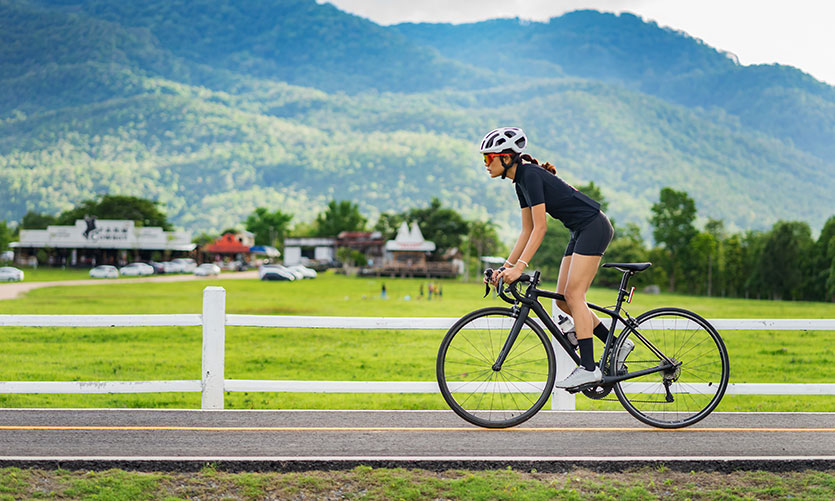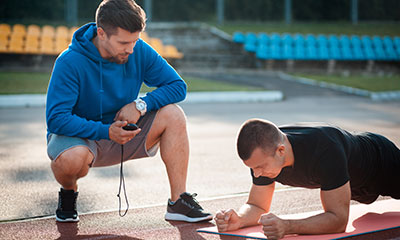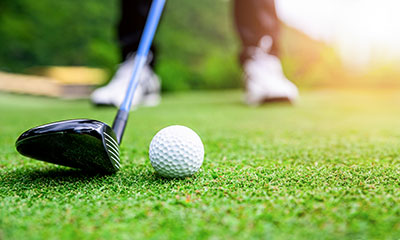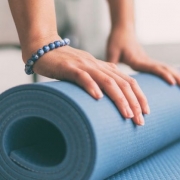Mental Toughness and More: The Benefits of Individual Sports

Individual sports take mental toughness. They demand you set personal goals, manage stress, build self-confidence, and develop focus. Team sports build comradery and group empathy, but it takes a strong mindset to compete—at any level—alone on the court. These hurdles, once conquered, make the benefits of individual sports plentiful.
Consider swimming for example. You determine your goals in the water. Do you focus on your stroke or how many laps you want to swim? The water shuts out the world, leaving you with only your stroke and your thoughts. Left without distractions (earbuds or a monitor to watch), this is a good time to focus on yourself and explore why you’re swimming in the first place.
The challenge is to find the mental toughness to keep swimming—digging deep for inner motivation. It’s important to identify why you’re competing and how to improve your performance. Personal goals can range from setting a world record to improving upon last week’s swim.
Let’s take a deep dive into individual sports, how they develop mental toughness, and the ways error management benefits your performance.
Benefits of Individual Sports
Humans are inherently social. Like most mammals, social tendencies develop through interaction with others. Sports help develop social hierarchies and positive self-esteem in a group context. Playing with others is a way to channel aggression into constructive activities.
Individual sports address different aspects of personal development. Athletes who participate in traditional and non-traditional solo sports—like tennis, swimming, rock climbing, cycling, or bowling—don’t rely on teammates for motivation or performance assessments. They set and pursue their own goals. Bearing the responsibility for achievement, solo athletes must push themselves to establish a healthy, competitive mindset. This can be as simple as setting small, obtainable goals. Or in the grander scheme, it can mean doggedly pursuing more ambitious ones.
Most sports help develop fine and gross motor skills, agility, endurance, and hand-eye coordination. But many more unique benefits of individual sports are revealed to dedicated participants. That’s because solo sports also require an additional layer of mental development, along with physical fitness. Your success and failures are yours alone. As you embrace and overcome personal setbacks, strengthening your coping skills and resilience, you develop self-esteem and confidence.
Long hikes, easy swims, or bike rides are all individual sports great for relaxation and reducing stress. They can clear your mind, offer perspective, and allow time for self-reflection. Any form of exercise supports cardiovascular and pulmonary health, can help reduce stress, and build confidence for future exercise.
Mental Toughness and the Tools for Solo Sport Success
With non-competitive sports—like trail running, rock climbing, or weightlifting—individuals set goals and determine how to achieve them. Take a trail runner participating in a 50-mile race. The primary goal is to reach the finish line. But to accomplish it, the runner must meet a series of benchmarks ranging from strategy (pacing, hydration, stretching) to sessions (breaking the run into segments). Each runner must identify personal strengths and pitfalls and create a running plan to best meet his/her needs.
To prepare for the 50-mile race, the runner has to train physically and mentally. Taxing events like ultramarathons require a strong, healthy mindset during the training and competition phase. Mental toughness is how you respond to discomfort or manage an obstacle or challenge. The key to developing mental toughness is to strengthen your willingness and channel optimism.
Willingness is your commitment to endure physical challenges and power through discomfort. Multiple factors determine willingness, but the best indicator is having a specific goal you want to accomplish. If the trail runner can envision crossing the finish line at the end of the 50-mile race, they can develop the mental fortitude to push through discomfort.
Optimism is the power to visualize and believe in your ability to reach your goal. It bridges the gap between where you are and where you want to be. Optimism shapes your short- and long-term goals. It’s motivation to train each day, coupled with the unyielding belief you’ll finish the race.
Mental toughness is developed through a willingness to do the hard work, combined with the optimism to believe you can achieve your goals. Just like your hands develop callouses from hours of work, mental toughness strengthens your competitive advantage while training and competing.
Solo, but Not Alone
Even when you compete for yourself, you still benefit from the support of coaches and teammates. Coaches share their expertise to help you to train and develop to your furthest potential. They guide your workouts and provide encouragement. And teammates give you a competitive edge. They help you set goals, breed healthy competition, and challenge you to work harder.
To Err is to Grow
Identifying errors while participating in solo sports is key to improvement. And the benefits go beyond just your performance while engaging in the activity. Golf is a good example for tracking errors during play.
Golf can be a frustrating game. Even if you’ve never played before, golf presents a serious of pitfalls that can put you in a foul mood. From errant tee shots to missed putts, it’s easy to play but extraordinarily difficult to master. Join a foursome for a full 18 holes and you’re not just competing against the other players—you’re challenging yourself.
Imagine it’s a beautiful morning and you’re teeing up on the first hole. You grab your golf club of choice. After a couple of practice swings, you adjust your glove and prepare for your first drive. You smoothly raise your club behind you, engaging a series of muscles (external abdominal obliques, gluteus maximus, pectoralis major, latissimus dorsi, and forearms), and swing.
If everything goes right, you’ll connect with the ball and send it flying towards the hole. The average golfer (76 percent of all amateurs) will swing a club 100 times through 18 holes. That’s 100 opportunities to analyze your performance in real time, make adjustments, and experience good and horrible shots.
Essentially, golf is a game of error monitoring—the process of assessing performance, making adjustments, and recognizing pitfalls. Researchers have studied focused attention (FA) and open monitoring (OM) meditation in conjunction with error monitoring. FA is your mind absorbing contextualized information in the moment. OM is your mind in a state of calm where it processes collected information. Evidence points toward a higher level of error monitoring when golfers can balance their FA and OM.
Golfers who can identify errors in their game are more likely to predict conditional stressors and self-regulate stress. By absorbing the moment, a golfer may have a better outcome (i.e. a more successful shot) than those who are indifferent to the situation. Specifically, when a golfer focuses on the shot ahead instead of the whole round of golf, they perform better and achieve a stronger level of overall satisfaction—even if the outcome is diminished performance.
Error monitoring is not only identified in golf. Numerous solo sports have real-time error monitoring. Mountain bikers make split-second decisions while navigating rocks, tree roots, and other obstacles. Kayakers experience the same immediate error monitoring maneuvering through rapids. Successful solo athletes have developed this common skillset to optimize their performance.
And the benefits are not limited to sports—developing error monitoring transcends to work and home life. Tracking your performance in real time can assist with decision making, organizational skills, and self-calming techniques.
Finding the Balance
Participating in solo sports is an opportunity to focus on yourself and your performance. Regular training can improve cardiovascular health, motor skills, and general health. In addition, the benefits of individual sports extend to improving your mental acuity for additional success.
From fly fishing to everyday life, balance shapes success. As you build up and come to rely on your own motivation, mental toughness, and error management, you’ll carry the personal skills to accomplish your goals. Individual sports can help your mental strength outside of the activity with improved mental focus which can assist in other aspects of your life.
References
http://www.kshsaa.org/Public/PDF/AcademicPerformance.pdf
https://www.ncbi.nlm.nih.gov/pmc/articles/PMC2527715/
https://www.psychologytoday.com/us/blog/in-flux/201410/the-importance-being-alone
https://www.runnersworld.com/runners-stories/a20783068/four-ways-to-build-mental-toughness/
https://www.huffpost.com/entry/the-power-of-a-present-mi_b_5615239
https://www.sportsrec.com/4592745/muscles-used-in-the-golf-swing
https://www.mdpi.com/2076-3425/9/9/226/htm
https://us.humankinetics.com/blogs/articles/developing-good-teammates
https://pubmed.ncbi.nlm.nih.gov/18727786/
https://www.psychologytoday.com/us/blog/the-power-prime/201009/sports-focus-control













